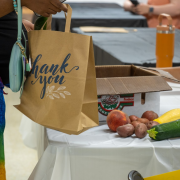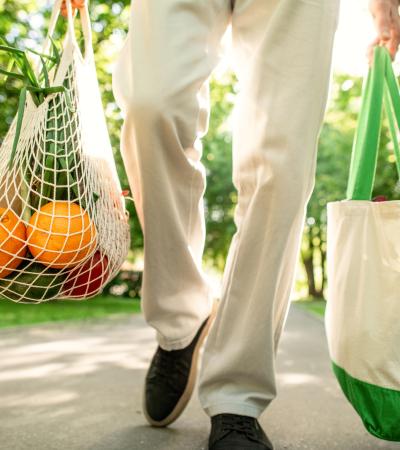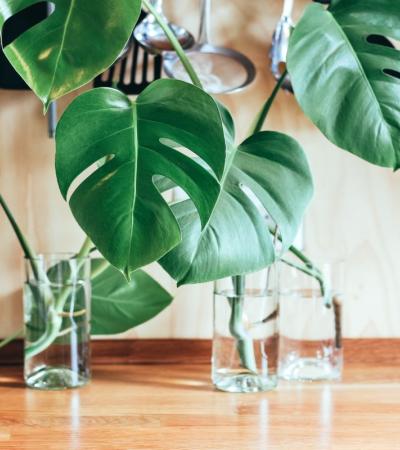The Free Vegetable and Flower Share was a five-part series from June to August. We offered a space for community members to display and share extra produce and flowers from their gardens.
Community members were welcome to browse and make selections to take home, regardless of whether they brought items to share. Recipes could also be shared. The library provided bags, colorful vases for flowers, cool lemonade to drink and recipes. Gentle background music added some ambiance.
Advanced Planning
We began planning the Free Vegetable and Flower Share in January 2024. Our EVPL Stringtown location manager and assistant librarian worked with many system-wide staff including the Chief Operating Officer, Director of Communications and Community Impact, Director of Public Services, Programming Manager and Outreach Manager to plan in collaboration with Urban Seeds, a local organization.
The location staff developed the initial idea and procedures, which were then revised and edited by systemwide leadership and then shared at multiple meetings with staff from all locations. We also contacted prospective community partners.
Marketing
Marketing materials distribution began in late May, a month before the event. Our marketing department created 26 posters and location staff distributed them at local service organizations, daycares, laundromats and to groups and partners both digitally and in person.
We also utilized social media and distributed about 200 postcard-sized flyers and posters throughout all EVPL locations. Press releases drew publicity from the local news media. We served well over 200 people over the entire summer, a huge turnout for our small location! We also advertised a requirement to register only if table space was needed to bring items to share. This turned out to be confusing and brought in fewer individuals to share their produce than we had hoped. Six individuals shared consistently throughout the summer, and we are so grateful for their generosity and community spirit.
Next year, we will likely eliminate registration to make sharing produce easier. Our primary partnership was with Urban Seeds, who generously shared vast amounts of produce, recipes and information about state, local and federal food justice initiatives. Our goal for next year is to increase partnerships with local growers who can in turn publicize the shares. Staff also created a festive bulletin board and buttons.
Budgeting
This program can be implemented for free. The library is simply providing a space for community sharing for 1-2 hours at a time. No permanent designated space is required, and in our experience, there is nothing left over after the Share so there’s no need to transport or re-home goods.
We spent under $75 on this program, but it could be done with no start-up money. We ordered 200 bags so people could carry their produce, and added some vases and tablecloths. For next year, we are thinking of repurposing our own grocery bags for this event. Using recycled vases and jars is eco-friendly and also a fantastic idea if your library wants to contribute something to hold the flowers.
Another option is to have a cloth bag decorating event before the program with schools or adult groups. We are also exploring the possibility of providing cloth bags and inviting customers to bring them back to share. Adding a library or event logo would be a larger one-time expense, but might provide visibility and promotion in the community.
Day-of-event Activity
Ideally, there are two staff members to help sharers carry and set up their produce or flower displays. Our teen volunteers helped our assistant librarian set up and take down for the event. Our primary flower supplier brought bouquets the day before, so usually we had flower vases ready in advance.
We set up our room with tables lining the periphery and added a table for lemonade, a kids’ craft table and a playset of a vegetable market to help keep little ones occupied and extend the experience. We also made lemonade and set up 30-40 cups for each event. This addition was especially appreciated by walking patrons on the hottest summer days. We also set up a cookbook display and had a recipe table to help inspire our guests with their newly selected produce.
Program Execution
We simply wanted to provide access to healthy foods in a pleasing, artisanal, community setting. The flowers, recipes and music gave the experience a zest and elegance our patrons really enjoyed. 27 to 51 people attended each Share, for a total of more than 200 patrons all summer long! Our goal was 175, so we exceeded our numerical goal.
We were also happy to provide play and craft stations for children, and we had at least ten young children per share. Families tended to stay beyond the time it took to browse, and the craft station and toys provided families with an enjoyable experience and time to make social connections. Urban Seeds shared information about SNAP and local food initiatives, as well as healthy recipes. For next year, we hope to be connected to more local growers through Urban Seeds.
We intentionally incorporated choice into the Shares by letting patrons and customers browse, rather than creating food boxes. Everyone was encouraged to take what they needed mindfully, knowing that others would benefit from vegetables and flowers. We developed a partner form, which may be changed significantly for next year. For more information email Heather Owens: howens@evpl.org
Advice
- Begin planning early. You will find there are many moving pieces.
- Find community support through a local food justice agency.
- Develop a set of procedures for what-if scenarios because the old adage is true: You don’t know what you don’t know.
- Plan for accessibility for those who may use assistive devices, have low vision or are hard of hearing.
- Invite the media. Our experience was very encouraging and the journalists present were sensitive to and proactive about individuals wanting to remain anonymous and not be photographed.
- Include access to a cold beverage such as water or lemonade for those who attend. Moving produce on hot summer days is a labor (of love).
- Don’t allow any selling or trading outside your designated space. Consider what makes you feel special in a retail situation, and replicate it to the extent possible at your free share.
- Consider growing vegetables onsite in your horticultural spaces for the share. Our amazing custodian planted tomatoes, squash and peppers for us, so we had library-grown veggies to share!
- Prepare to be amazed by the generosity of your community.
Supporting Materials
- Feedback (Coming Soon!)
- Programming Librarian Facebook Group




